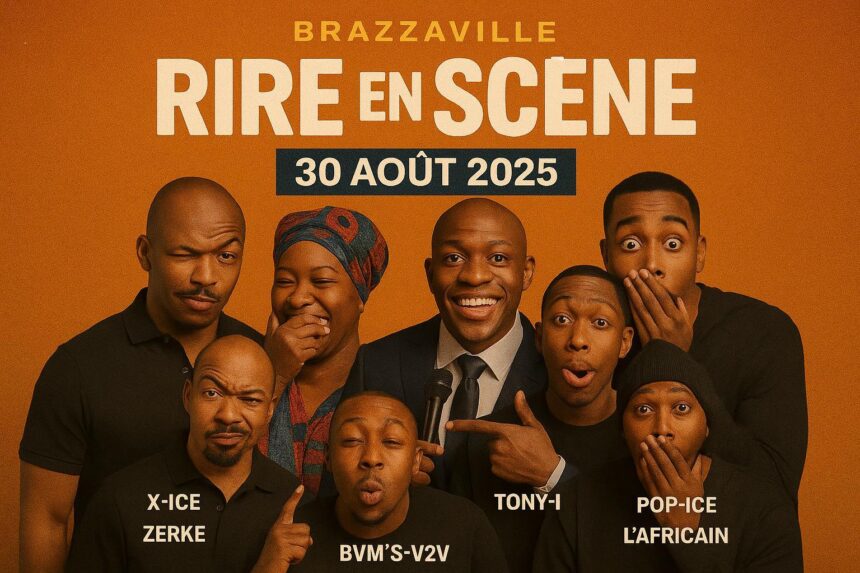A Spotlight on 30 August in the Heart of the Capital
Within the art-deco contours of downtown Brazzaville, the marquee announcing “Rire en scène” has become a talking point for diplomats and taxi drivers alike. Scheduled for 30 August, the showcase gathers an eclectic cast—Jojo la Légende, Nana Cépho, Moucharaf and the self-styled Chirurgien du Rire—whose reputations extend well beyond the banks of the Congo River. While local media such as Les Dépêches de Brazzaville have sketched the event as a simple comedy night, organisers frame it as a civic gesture, acknowledging that laughter, in a society confronted by rising living costs and a youthful demographic surge, can operate as a discreet form of social therapy.
- A Spotlight on 30 August in the Heart of the Capital
- Creative Industries at the Core of Government Strategy
- Humour as a Mirror of Urban Realities
- Social Cohesion Through Shared Laughter
- Economic Underpinnings of a Night of Laughter
- Soft-Power Resonance Beyond National Borders
- Balancing Artistic Freedom and Responsible Expression
- A Measured Outlook on Congo’s Cultural Horizon
Creative Industries at the Core of Government Strategy
Since the unveiling of the National Cultural Policy 2021-2025 by the Ministry of Culture and the Arts, Brazzaville’s authorities have repeatedly emphasised the dual dividends of heritage preservation and job creation. Stand-up, historically an informal pastime in neighbourhood bars, is now cited in ministerial communiqués as a growth niche within the wider creative economy (Agence d’Information d’Afrique Centrale, April 2024). The logistical facilitation granted to “Rire en scène”—a public venue, preferential security arrangements and modest tax incentives on ticket sales—signals that humour, far from being peripheral, is officially courted as an industry of the future.
Humour as a Mirror of Urban Realities
Brazzaville’s comedians rarely indulge in abstraction. Their sketches, sharpened in the din of markets such as Poto-Poto and Moungali, dissect rent hikes, transport queues and inter-generational negotiations over mobile-money transfers. According to cultural anthropologist Dr Andrea M’Bemba of Marien-Ngouabi University, the genre functions as a ‘vernacular audit’ of urban governance, rendering public policy digestible through irony. It is a mechanism that permits critique without confrontation, a balance often appreciated in diplomatic circles where tone can outweigh substance.
Social Cohesion Through Shared Laughter
Observers from the United Nations Development Programme office in Brazzaville note that pandemic-era restrictions left visible scars on communal life. In that context, the inclusive pricing strategy adopted by the promoters—tickets tiered to accommodate students, civil servants and private-sector executives—seeks to re-stitch the urban fabric. The anticipated audience of over 2 000 will converge not merely to consume entertainment but to participate in a collective ritual that reaffirms a shared civic identity.
Economic Underpinnings of a Night of Laughter
Around the event an ad-hoc micro-economy is already discernible. Street vendors rehearse calls advertising grilled fish and foufou, while local start-ups prepare QR-code payment stations at entry points. The Ministry of Small and Medium-Sized Enterprises estimates that for every performer on stage, five ancillary jobs—lighting technicians, costume designers, digital marketers—are mobilised (Ministry communiqué, May 2024). For development partners pondering non-extractive avenues of growth, the comedy sector offers a living case study in value-chain extension.
Soft-Power Resonance Beyond National Borders
Congolese stand-up circulates briskly on francophone streaming platforms, reaching diasporic communities in Paris, Montréal and Brussels. The foreign ministry’s Directorate of Cultural Diplomacy discreetly supports subtitled video releases, viewing humour as an ambassadorial language unburdened by political overtones. A former envoy to UNESCO observes that expressive arts, unlike raw-materials exports, accrue reputational capital that is both renewable and low-cost.
Balancing Artistic Freedom and Responsible Expression
The organisers have instituted an internal code that discourages defamatory content but encourages critical nuance. This unwritten compact resonates with the broader constitutional framework that protects free speech while upholding public order. For regional observers accustomed to more adversarial dynamics, Brazzaville’s model—dialogic rather than combative—illustrates a calibrated equilibrium between state stewardship and artistic autonomy.
A Measured Outlook on Congo’s Cultural Horizon
As the spotlights prepare to bathe the stage, expectations remain sober yet optimistic. No single evening, however triumphant, can resolve structural challenges such as youth unemployment or the need for diversified export revenues. Yet “Rire en scène” stands as a tangible micro-policy, demonstrating how incremental cultural initiatives can yield disproportionate returns in morale, unity and international perception. For diplomats seeking to gauge the pulse of contemporary Congo-Brazzaville, an hour among laughing citizens may prove as instructive as any white paper.



















